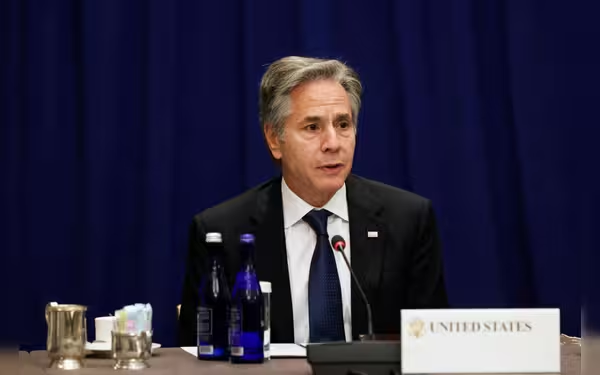Saturday, November 16, 2024 05:37 PM
Blinken's Firm Stance on Myanmar and China at East Asia Summit
- Blinken addresses Myanmar's military junta at summit.
- US supports ASEAN's initiatives amid Myanmar's crisis.
- China's South China Sea claims discussed by Blinken.
 Image Credits: arabnewspk
Image Credits: arabnewspkUS Secretary of State Antony Blinken addresses Myanmar and China at the East Asia Summit, emphasizing diplomatic relations and regional stability.
US Secretary of State Antony Blinken has arrived in Laos for the East Asia Summit, a significant gathering where he is expected to take a strong stance on two pressing issues: the military junta in Myanmar and China's assertive actions in the South China Sea. This summit marks a crucial moment for diplomatic relations in the region, especially as Blinken represents the United States in the absence of President Joe Biden, who is skipping the event for the second consecutive year.
The East Asia Summit is an annual meeting that brings together leaders from Southeast Asian nations and their partners. This year, it is particularly noteworthy as Myanmar is sending a representative to the ASEAN bloc for the first time in over three years. This development comes amid ongoing efforts by diplomats to re-engage with Myanmar's military government, which has faced international criticism for its actions since the coup in 2021.
Daniel Kritenbrink, the top US diplomat for East Asia, emphasized the United States' support for ASEAN's initiatives but also highlighted the need for continued pressure on Myanmar's military regime. He stated, "Unfortunately, we have seen virtually zero progress" from the junta regarding key issues such as the release of political prisoners and the reduction of violence against ethnic groups. This lack of progress raises concerns about the junta's commitment to reform and reconciliation.
In addition to addressing the situation in Myanmar, Blinken is also set to discuss China's increasingly assertive claims in the South China Sea. His recent meeting with his Chinese counterpart in New York underscores the importance of this issue. The United States aims to support Southeast Asian nations in voicing their concerns about China's actions, which have raised tensions in the region.
While the focus of discussions in Laos will primarily be on these critical issues, Blinken is also scheduled to meet with Malaysian Prime Minister Anwar Ibrahim. Anwar has been openly critical of US support for Israel, reflecting the complex political landscape in the Muslim-majority nation. US officials recognize the political pressures Anwar faces and are keen on fostering a cooperative relationship with him, especially given his past advocacy from Washington during his controversial imprisonment.
Furthermore, Blinken will engage with Thailand's new Prime Minister Paetongtarn Shinawatra, reinforcing the longstanding alliance between the United States and Thailand, which is the oldest US ally in Asia. These meetings highlight the importance of maintaining strong diplomatic ties in a region that is increasingly influenced by both geopolitical tensions and economic opportunities.
As the East Asia Summit unfolds, the outcomes of these discussions will be closely watched. The United States' approach to Myanmar and China will not only shape regional dynamics but also reflect its broader foreign policy objectives in Asia. The stakes are high, and the world will be looking to see how these diplomatic efforts unfold in the coming days.













